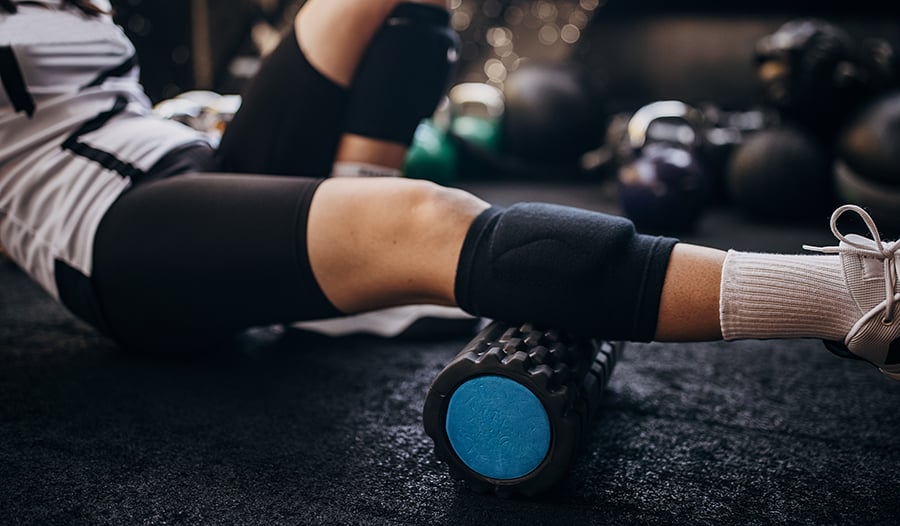Sore Muscles + Joint Pain? Specialized Pro-Resolving Mediators (SPMs) May Help Recovery

In the dynamic world of sports medicine, athletes and active individuals are always on the lookout for innovative ways to boost recovery and manage minor pain.
Among the latest advancements in this field are specialized pro-resolving mediators (SPMs), a promising approach to addressing inflammation and supporting overall health.
This article explores what SPMs are, their significance in sports medicine, and how this powerful supplement can be a game-changer for exercise recovery and pain relief.
What Are Specialized Pro-Resolving Mediators (SPMs)?
SPMs are compounds that your body naturally makes to help manage inflammation and speed up recovery. Think of them as your body’s "cleanup crew" that steps in after the immune system fights off an injury or infection.
How Do SPMsWork?
SPMs work by calming down the inflammation, helping damaged tissue heal faster, and preventing things from getting stuck in an endless cycle of pain or swelling.1-5
SPMs work differently from traditional pain relievers like ibuprofen or aspirin. While those medications block the signals that cause pain and swelling, SPMs help your body naturally resolve these issues. Instead of just stopping the pain, SPMs guide your cells to clean up and repair the area after an injury, helping your body recover fully. The best part? By working with the body’s natural healing process, SPMs help avoid common side effects of traditional anti-inflammatories, such as stomach irritation, high blood pressure, and delayed healing.1,6,7
Benefits of SPMs
Reduce Post-Exercise Soreness and Quicker Recovery
By enhancing the body’s ability to resolve inflammation, SPMs help reduce post-exercise soreness and support quicker recovery.3,11,17,18
Support Joint Health
Effective inflammation resolution benefits joint health by preventing chronic inflammatory conditions that can impair joint function.9,17
Improve Exercise Tolerance
By managing inflammation more effectively, athletes may experience better performance and increased tolerance to physical stress.8
Why Are SPMs Important?
SPMs are crucial for preventing chronic, long-term inflammation, which is associated with various health concerns such as persistent pain, joint damage, and impaired recovery.1 For athletes and individuals engaged in intense physical activities, managing inflammation and these health issues effectively is key to maintaining performance and health. SPMs offer a targeted approach by addressing the root cause of inflammation and supporting a more efficient healing process.8-11
Unlocking Full Recovery: Protein Alone Won't Cut It
While protein is often the go-to supplement for athletes aiming to enhance muscle repair and growth, it’s not the only factor required for full recovery. Protein primarily helps rebuild muscle fibers after exercise, but recovery also involves addressing muscle soreness, fatigue, and overall tissue repair. This is where protein alone falls short. Protein cannot fully address the muscle stress and strain that often follow intense workouts. If these issues are not properly managed, recovery may slow down, impacting performance and increasing the risk of injury.12,13
Adding SPMs to an athlete's recovery regimen provides extra support as they help the body manage post-exercise muscle soreness and promote faster tissue repair, ultimately helping you bounce back more quickly. By combining protein with SPMs, athletes can address both muscle rebuilding and the lingering discomfort that comes after tough training sessions, leading to a more complete and efficient recovery.12-14
Why Supplement With SPMs?
Producing enough SPMs requires good nutrition and a healthy lifestyle, but sometimes that’s not enough to overcome muscle soreness, fatigue, and overall tissue repair.1-3 Several factors can limit the body’s ability to produce SPMs, such as:
- Exposure to environmental irritants
- High intake of processed carbohydrates
- Not exercising enough or exercising too much
- Poor-quality sleep
While making lifestyle and dietary changes can slightly boost SPM production, they often don’t make a big difference because as we age, our ability to produce SPMs naturally decreases. A more targeted way to boost your SPM levels is by taking supplements that provide them directly. Research shows that taking 2 to 6 soft gels of SPMs daily for six weeks can help reduce inflammation in the body, which often leads to less pain and discomfort.15,16
Since your body naturally produces SPMs to help reduce inflammation, these supplements won’t weaken your immune system like some anti-inflammatory medications, such as steroids, methotrexate, or even aspirin. This makes SPMs a safer choice for long-term use, with no known interactions with other medications or supplements. Anecdotally, some doctors have safely recommended doses greater than the documented 6 soft gels per day, suggesting that higher amounts may be effective for managing inflammation and pain without adverse effects.1,6,7
Current Utilization of SPMs in Clinical Practice
Based on the promising published data, doctors are beginning to integrate SPMs into sports medicine practices, recognizing their potential to enhance recovery, manage inflammation, and optimize performance.
Recovery Enhancement
- Personalized Recovery Plans: By targeting inflammation more precisely, SPMs help reduce post-exercise soreness and expedite recovery. This approach is particularly useful for athletes experiencing delayed-onset muscle soreness (DOMS) or repetitive strain injuries.
- Supplement Regimens: Athletes are using SPMs as part of their regimens to support overall recovery. These supplements are typically taken during periods of intense training or competition to optimize the body’s natural healing processes.
Long-Term Joint and Tissue Health
- Chronic injuries: For athletes with chronic inflammatory conditions, such as tendinitis or bursitis, SPMs offer a more targeted approach than traditional anti-inflammatory drugs. Doctors are incorporating SPMs to address the underlying inflammation and promote long-term joint and tissue health.
- Acute Injuries: In cases of acute sports injuries, such as sprains or strains, SPMs are used alongside other treatments to enhance the body’s healing response and reduce inflammation at the injury site.
Performance Optimization
- Training Adaptation: SPMs are being used to support athletes in adapting to intense training regimens. By managing inflammation and promoting faster recovery, athletes can train more effectively and achieve better performance outcomes.
- Pre-Competition Preparation: Some doctors are recommending SPM supplementation before major competitions to help reduce baseline inflammation and support peak performance.
Conclusion
Specialized pro-resolving mediators (SPMs) represent a sophisticated approach to managing inflammation and promoting recovery in sports medicine. SPMs offer targeted benefits for exercise recovery and minor pain relief. As research and clinical experience with SPMs continues to grow, their integration into sports medicine practices is likely to expand, providing athletes with advanced tools for achieving peak performance and efficient recovery. For those interested in exploring SPM supplementation, consulting with a doctor can help determine how this supplement might best fit into your recovery strategy.
References:
- Serhan CN et al. Nature. 2014;510(7503):92-101.
- Serhan CN et al. Nat Rev Immunol. 2008;8(5):349-361.
- Levy BD et al. J Clin Invest. 2012;122(7):2747-2754.
- Schwab JM et al. Nature. 2007;447(7141):869-874.
- Gilroy DW, Serhan CN. Nat Rev Immunol. 2020;20(6):404-419.
- Harirforoosh, S., et al. J Pharm & Pharm Sci.2013;16(5), 821-847.
- Lanas, A., & Chan, F. K. The Lancet. 2017;390(10094), 613-624.
- Birklein DS et al. J Pain Res. 2020;13:1183-1193.
- Norling CA, et al. Front Immunol. 2017;8:523.
- Dalli J et al. J Clin Invest. 2015;125(7):2757-2765.
- Calder PC. Front Nutr. 2019;6:73.
- Calder, P. C. Biochemical Society, 2021; 49(1), 267-276.
- Dalli, J., & Serhan, C. N. Nature Immunology. 2020; 21(4), 442–454.
- Tipton, K. D. Sports Medicine. 2013;43(1), 91-98.
- Dalli, J., et al. Journal of Clinical Investigation, 2013;123(6), 2116-2127.
- Tsuji, H., et al. European Journal of Pain, 2020;24(3), 496-506.
- Philpott T et al. Int J Sport Nutr Exerc Metab. 2018;28(3):236-244.
- Rees VE, et al. J Sports Sci Med. 2021;20(1):45-53.
DISCLAIMER:This Wellness Hub does not intend to provide diagnosis...
















































































 Table of Contents
Table of Contents


